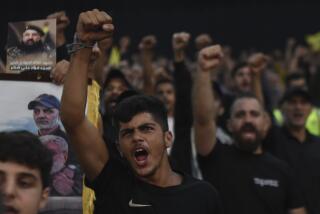Force Is Poor at Stifling Terrorism
The recent suicide bombings by Palestinian extremists in Israel starkly demonstrated the failure of the Sharon government’s policy of assassination and military intimidation to prevent terrorism and protect lives.
The belief that military action alone can mitigate terrorism is unfounded and irresponsible. Lessons learned from various counter-terrorism campaigns during the last three decades--India’s military-heavy policy in Kashmir and U.S. strikes against Libya and the Osama bin Laden network--illustrate that such measures can actually stimulate new violence. Similarly, the 1998 missile strikes against Afghanistan and Sudan have done little to prevent attacks against U.S. interests, fueling instead anti-U.S. sentiment and distrust throughout the Islamic world.
In sharp contrast, military and paramilitary actions in Italy, Spain and Northern Ireland have been broadly supplemented by preventive measures centered on economic development and expanded political autonomy.
Admittedly, terrorism in Spain and Northern Ireland continues. Yet, the level of popular support and pool of potential recruits--the seeds of wider conflict--have been minimized by a combination of legitimate economic, political, military and law enforcement action rather than a sole reliance on military force.
The inherent inability of military and paramilitary actions to halt terrorist violence, particularly violence motivated by nationalist or religious fervor, is that such action often results in the death of innocents, thereby fomenting popular anger and a desire for revenge.
The effect of the Dolphinarium nightclub and Sbarro pizzeria bombings reflects the point; parts of Israeli society once open to dialogue were suddenly moved to support illegal killings and collective punishment.
Palestinian society is no different. Each time Israel conducts an assassination operation in the territories, or when settlers randomly fire on Palestinian homes and vehicles, lives of innocents are threatened--and often lost--and thus the cycle of retaliation is ensured. Moreover, the lack of any legal pretext for such actions places Israel outside the self-proclaimed ethical bounds held central to its foundation and continued existence.
Contrary to repeated Israeli and U.S. statements regarding Yasser Arafat’s ability to control extremists, divisions within Palestinian government and society--exacerbated by U.S. and Israeli demands for state-like action from an increasingly illegitimate non-state entity--render unrealistic the demands to control every potential terrorist action.
These statements merely increase popular support for extremists.
Even within those groups, either directly sponsoring or linked to terrorist acts, there are multiple divisions and no cohesive and accountable hierarchy. Fatah, the secular movement which Arafat heads, itself is divided. The absence of a real Israeli or U.S. willingness to promote a politically, economically stable Palestinian state makes it impossible for Arafat to justify mass arrests and detentions of anti-Israeli extremists. Moreover, by asking the Palestinian Authority to conduct mass arrests and detentions, Israel and the U.S. are reinforcing the PA’s repressive instincts; do Israel and the United States want the PA to discard notions of democracy and human rights in favor of actions more akin to regimes in Syria or Iraq?
This pressure not only garners even greater Arab distrust of U.S. policy in the region but also needlessly endangers American as well as Israeli lives while promoting the creation of yet another authoritarian Arab regime.
There can be no justification for terrorism. Israel’s dependence on assassination and military intimidation--methods centered on terror and fear--to combat extremism and impose an overtly pro-Israeli settlement jeopardizes innocent Israeli lives.
A stable, politically and economically viable Palestinian state is essential for Israel’s security. Without a counter-terrorism policy that prioritizes such development, Israeli leaders are guaranteeing prolonged bloodshed.
More to Read
Sign up for Essential California
The most important California stories and recommendations in your inbox every morning.
You may occasionally receive promotional content from the Los Angeles Times.










